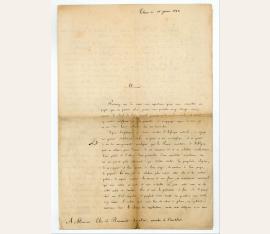French colonial officer and explorer (1832-1881). Autograph letter signed. Tebessa. 10.01.1862. Folio. 6 pp. on bifolia. With autograph address. In French.
$ 2,659 / 2.500 €
(82572/BN53743)
Comprehensive proposal for an expedition to French Sudan (now Mali), written to the influential geologist Léonce Élie de Beaumont (1797-1874). Flatters presents his plan enthusiastically and in ample detail, although it had already been rejected by his superiors at the Ministry of War, hoping that Beaumont might use his political influence to reverse the decision. - Flatters' plan was to disguise himself as an Algerian merchant and join the caravans heading south-west. Departing from Tamacine or Ouargla, he would have taken the traditional trade route via the Algerian Tuat region to Timbuktu and traversed French Sudan in 18 to 24 months, eventually reaching French Senegal.
The purpose of the expedition was to "visit remote tribes, to inquire into their customs, the resources of their lands, to prepare paths for more stable relations between them and more civilized nations, to contribute [...] to the trade relations that we have the right to establish one day between ourselves and the rich areas of Sudan". As Flatters "had always thought of an exploration of Sudan", he stresses that he employed his leisure time "to study natural history, principally in what concerns botany, geology, and minerology", and although he had "no pretentions to the name of a botanist or geologist", Flatters believed that he would be able "to determine the principal points, the most important facts, in a word, to plant some stakes that will be of future use". - In disguising as a Muslim, Flatters would have followed the examples of Auguste René Caillé and Heinrich Barth, the only Europeans who had at the time visited Timbuktu and returned safely. He mentions both men, as well as Major Gordon Laing, the first European who had reached Timbuktu but "was assassinated for having neglected to take the same precaution" a few days after he had left the famed city in 1826. Despite the apparent dangers and the questionable success of any disguise, Flatters was highly motivated, as he had "long desired to visit central Africa" and looked forward to an "adventurous expedition". He lays out his plan to Beaumont with great certainty: "I will leave without noise, without letters of recommendation, and I will be a simple merchant travelling for business without any official character; [...] lost among all the indigenous people who take the route south frequently, nobody will pay attention to me, my security will only be greater, and I will be able to observe more easily". - Although Flatters was willing to take the risk of an unofficial expedition as a "simple private person", as long as he would "recover his two epaulets" upon his return, the Ministry of War deemed the risk to great, arguing that it would have had to retaliate in case of an assassination of a French officer. Flatters suspected that the true reason for the refusal were the costs of the expedition. He therefore tried to obtain funding from the Société de Géographie and enjoyed the support of the philanthropist Isidore Taylor who had supported the plan at the Ministry of War. - While Flatters' pleas to Beaumont came to nothing, his plan proved anticipatory of the colonization of Mali from 1880. Initially called "Upper River", the colony started as an extension of French Senegal. In 1890 the establishment of French Sudan followed, adding to the vast territories that constituted the Federation of French West Africa from 1895 to 1958. - Paul Flatters' fate was inextricably connected with the French colonial project. In the letter he describes his military career, his position in the Arab Bureau in Tebessa, and his purported familiarity with the locals: "For a long time in Arab affairs, I have had frequent contact with the indigenous peoples; I speak and write Arabic; the manners and customs of the various tribes are familiar to me; the history and the geography as well as the ethnography have not been neglected [...]". In 1879 he was finally able to undertake an expedition to explore the potential for a railway through the Sahara. The small expedition soon met local resistance and withdrew. A second expedition of 93 men with the same objective that left Ouargla on 4 December 1880 ended in tragedy: several participants, including Paul Flatters, were killed on 16 February 1881 by Tuaregs in the Hoggar Mountains. The survivors were left without their camels and had to return under catastrophic circumstances, eventually ending in cannibalism. No Frenchman was among the few survivors of the expedition. Flatters might have been right about the ulterior motives of the Ministry of War in preventing his 1862 expedition plan, as there was no retaliation for the violent deaths of nine Frenchmen and their local companions. - Some browning to the first page, minimal foxing and several minor tears..
